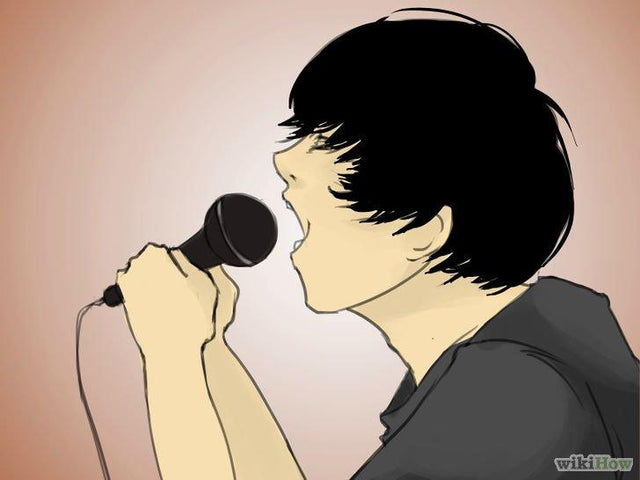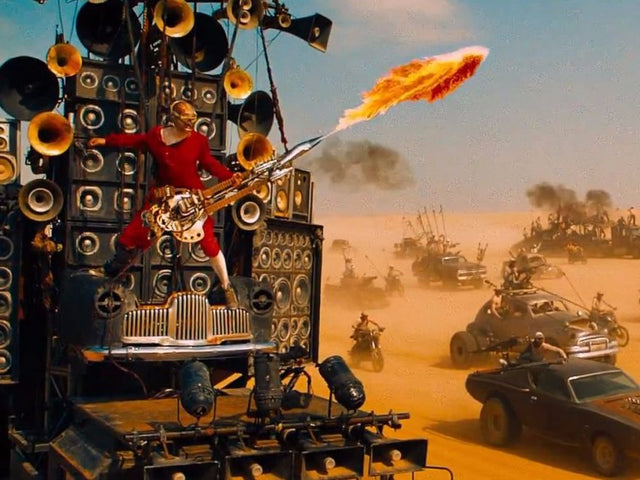I 10 migliori album SST Records da possedere in vinile
In the 1970s and ‘80s, corporate rock was a ubiquitous cultural force. Major labels decided which artists got signed, what got recorded, and what got released. They controlled distribution. They controlled access to radio, TV, the press, and made touring possible. They determined the hits, dictated popular tastes, and if you liked it, you were in luck, because corporate rock was everywhere and easy to find. If you didn’t like it, you were stuck. As Dead Kennedys guitarist East Bay Ray told me in July 2016, “At the time, in the late ‘70s, the radio was all disco and the Eagles. Neither one rocked my heart very much.”
The answer, for many, was punk. But punk—specifically punk’s second wave, not the original punk the majors embraced—was ignored. Corporate rock wasn’t interested. Your band wasn’t going to get signed. Your music wasn’t going to get recorded. Clubs weren’t going to book you. The press wasn’t going to write about you. The radio wasn’t going to play your songs. Record stores weren’t going to sell your music. And that left you with one of two options: You could complain and do nothing, or you could do it yourself.
And “do it yourself” meant do everything yourself, which included starting a record label. Many people did, and a number of small-but-mighty independent labels popped up in the early 1980s, labels like Dischord, Touch and Go, Alternative Tentacles, Homestead Records, and many others, which today retain an aura of legend. But the undisputed kings—the hitmakers of the 80s underground—was SST.
SST Records started life in 1966 as Solid State Tuners, a business founded by Greg Ginn, a 12-year-old ham radio enthusiast, which sold modified surplus WWII-era radio equipment. In 1979, Ginn converted his business into an independent record label to release Nervous Breakdown, his band Black Flag’s first EP. By the mid-’80s, the label was thriving. It boasted a formidable roster and offered younger bands a pathway to bookings, tours, college radio, and press.
SST was a big deal, but unfortunately, it didn’t last. By the end of the ‘80s—plagued by lawsuits, band defections, major label poaching, and their distributor’s bankruptcy—SST fell into decline. They didn’t go out of business, but it was the end of an era. The glory days were over. Below are the 10 best SST releases. SST’s catalog lists nearly 400 titles, which is a lot to chose from. Also, this list only includes albums that SST originally released, which is why a great album like the Descendents’ Milo Goes to College isn’t included (it was originally on New Alliance, the Minutemen’s label, which Mike Watt sold to SST following D Boon’s death). The albums SST still owns—that haven’t been reissued on other labels—are still available on vinyl. SST sells them direct and—consistent with their DIY ethos—they’re still relatively cheap.

Black Flag: Damaged
Damaged is Black Flag’s first full length release and a milestone in the band’s history. Henry Rollins joined the band and Dez Cadena—the third in a line of lead singers—moved over to rhythm guitar. Greg Ginn, the band’s lead guitarist, wrote most of the material and his songwriting—similar to other LA bands like Fear and the Circle Jerks—is a potent brew of testosterone and sarcasm. The band is tight and well-rehearsed. The tracks sound like they were cut live—though most of the vocals were overdubbed later—and the production values are raw. Those ingredients, plus a cover that (almost literally) bleeds attitude, make Damaged a genre defining statement of early-80’s hardcore.
Plus, Ginn plays his ass off. His tone is nasal, biting, and at the edge of feeding back—he’s probably using a solid state amp, which was a big taboo in the era of radio-friendly corporate rock—and his solos on songs like “Police Story,” “Rise Above,” and “Padded Cell” are a flurry of fast notes that flirt with dissonance and obliterate melody.

Minutemen: Double Nickels on the Dime
“‘Double nickels on the dime’ means driving the speed limit,” Mike Watt told me when I interviewed him last year for a feature about D Boon in Premier Guitar. “We were making fun of Sammy Hagar. He said he couldn’t drive 55, but he made all this safe music. We said, ‘We’re going to drive safe, but we’re going to make crazy music.’ Nobody got it.”
Maybe nobody got the joke, but they sure got the music. Double Nickels features punk anthems like “This Ain’t No Picnic,” “Jesus and Tequila,” “Little Man With A Gun In His Hand,” and “Corona.” It showcases the band’s virtuosity, like Boon’s supercharged funk comping on “West Germany” and “The Roar of the Masses Could Be Farts.” It’s raw, irreverent, and incorporates the disparate influences that inspired the band. Plus, unusual for punk, it’s chockfull of covers from bands like Creedence Clearwater Revival, Van Halen, and Steely Dan.
Double Nickels is an album you need to hear on vinyl because the various digital versions omit great tracks like “Little Man With A Gun In His Hand” and their cover of Van Halen’s “Ain’t Talkin’ ‘bout Love.” Plus, it’s the only way to truly appreciate Raymond Pettibon’s provocative gatefold artwork.

Dinosaur Jr: You’re Living All Over Me
You’re Living All Over Me is Dinosaur Jr’s second release and—following a legal threat from the Dinosaurs, a supergroup made up of former members of the Jefferson Airplane and Country Joe and the Fish—the first to include “Jr” as part of their name. It’s also a showcase for those things that made Dinosaur Jr unique: J Mascis’s vocal twang—a style somehow inspired by a combination of Mick Jagger’s fake southern accent (from songs like “Dead Flowers” and others) and John Fogerty, Lou Barlow’s unusual approach to bass playing, indie-friendly songwriting coupled with raging guitars, and controlled/ordered chaos.
The sonic assault starts with the first notes of “Little Fury Things” and continues throughout—and features standout guitar solos on songs like “Kracked,” “Sludgefeast,” and “Raisans”—but is balanced with subtle quiet, dynamic contrasts, and experimentation (like the ambient soundscape spliced into “Poledo”).

Meat Puppets: Meat Puppets II
In many ways, the Meat Puppets’ second album, Meat Puppets II, is a quintessential SST release. Like many SST bands, the Meat Puppets first album was a righteous mess (I mean that in the best way possible), but as they evolved—and as their playing improved—the idiosyncrasies hinted at in their earlier output bubbled to the surface.
Meat Puppets II draws from the deep wells of country music. “Split Myself in Two,” the album opener, starts out heavy enough, but by the second song, “Magic Toy Missing,” the raunchy guitars are replaced with fingerpicked electrics and an authentic hoedown feel. That dichotomy—a jerky country groove combined with noisy guitars—permeates the entire album. Meat Puppets II also contains a nod or two to classic rock including a sloppy quote of Led Zeppelin’s “Over the Hills and Far Away” at the opening of “Lost” and a subtle whiff of Neil Young’s, “The Needle and the Damage Done,” in the melody of “The Whistling Song.”

Bad Brains: I Against I
I Against I is the third Bad Brains release and the first on SST. Bad Brains pioneered hardcore, although—aside from hardcore’s energy and speed—their sound owed a lot more to reggae, metal, and their sophisticated harmonic sense. And with I Against I, they were ready to explore some of that depth.
I Against I includes its share of face-melting hardcore like the title track and “House of Suffering,” but it also has a surprising number of mid-tempo cuts like “Secret 77” and “Sacred Love”—which, according to legend, features a vocal performance phoned in from prison. I Against I is raw, the band is tight, and HR’s vocals are in rare form, but, my goodness, Dr. Know’s guitar playing is the album’s highlight. On solo after solo, he unleashes a torrent of notes, squealing harmonics, whammy manipulations, and atonal excursions that synthesize, perfectly, the raw energy of hardcore with the maturity of a seasoned veteran.

Soundgarden: Ultramega OK
The ingredients that made Soundgarden—muscular vocals, heavy riffs, and angst—are on Ultramega OK, their first full length release, in abundance. But more, with the inclusion of oddball cuts like “665,” “667,” and “One Minute of Silence,” Soundgarden showed off their artistic depth. They accessed that depth—something which put them a step ahead of most of the major label me-too ‘90s-era grunge crowd—on later releases, like Badmotorfinger, in the guise of odd meters, alternate tunings, saxophones, and other nods to the avant-garde.
In interviews, band members have indicated they were unhappy with Ultramega OK’s production, which explains the title: as in ultra-mega, but just ok. Although with the benefit of hindsight, it’s obvious Soundgarden was a band destined for greatness, despite SST’s spiritual distance from their flanneled, Seattle-area roots. Ultramega OK is a document of a major act getting it together, dealing with the headaches of small budgets, reveling in a warped sense of humor, and even giving their bass player an opportunity to sing lead (on “Circle of Power”), despite having Chris Cornell as a frontman.

Sonic Youth: Evol
If nothing else, Sonic Youth’s Evol, their first of two albums on SST, was the album that brought Mike Watt back from the brink. Watt was still reeling from the recent death of D Boon—his oldest friend and coconspirator in the Minutemen—and was encouraged to play bass on “In the Kingdom #19,” plus a non-album cover of Kim Fowley’s “Bubblegum.” Evol is also the first Sonic Youth release to feature drummer Steve Shelley.
If you dig Sonic Youth, Evol delivers in spades. It is chock full of what they’re known for—unconventional guitar tunings, harnessed feedback, and non-traditional guitar tones—but is also the starting point for their more “commercial” songwriting that came later. Sonic Youth’s relationship with SST didn’t end well—they even took legal action to get back their masters—but in the beginning, signing with SST was a huge step forward and brought them their first mainstream press.

Hüsker Dü: Flip Your Wig
Zen Arcade may have been Hüsker Dü’s magnum opus, but 1985’s Flip Your Wig was the band’s peak. The album is a hook-driven, accessible, and upbeat effort, and laid the foundations for what was to become power pop. Flip Your Wig was also the first album Hüsker Dü produced themselves. It’s still Hüsker Dü—and the guitars are still dripping in fuzz—but it’s also radio-friendly and singable. The album features the single, “Makes No Sense At All” (backed with a cover of “Love Is All Around,” the campy theme from the Mary Tyler Moore Show), which even received moderate play on MTV.
But Flip Your Wig isn’t just a collection of singable hits, the experimentation started on Zen Arcade is still in play—like backwards tape effects, grating guitar noise, and piano—and is featured on the instrumentals “Don’t Know Yet” and “The Wit and the Wisdom.” The album even has goofy slide whistles and xylophones, like on “The Baby Song.” Flip Your Wig was the band’s last release on SST—out of loyalty it wasn’t given to Warner Brothers, to whom they’d just inked a deal—and probably their last great record.

Gone: Gone II – But Never Too Gone!
In 1986, word on the street was that you had to check out Gone, Greg Ginn’s other band. Not because it was awesome—though it was—but because it featured Andrew Weiss’ raging slap bass (credited as bassosaurus), which at the time, and especially for punk, was radical.
But killer bass playing notwithstanding, Gone was anything but a musical freak show and their second release, Gone II – But Never Too Gone!, is an instrumental tour de force. The songwriting departs dramatically from Ginn’s Black Flag output and features through-composed movements, free improvisations, and recurring themes. It’s tuneful at times, like on “New Vengeance,” but other times obliterates melody and meter. The album features a mature Ginn, growing ever more comfortable with his abilities as a guitarist, stretching out and challenging his audience with new and adventurous music. Plus, you also get killer thumping bass riffs like the opening to “Jungle Law,” “Turned Over Stone,” and the totally free “Utility Hole.”

fIREHOSE: Ragin’, Full On
Ragin’, Full On is Firehose’s first album. The band—Mike Watt, George Hurley, and Ed Crawford—is two-thirds Minutemen, so comparisons are inevitable, but Firehose is definitely its own thing. For starters, Firehose songs are longer, with many hovering around the three-minute mark. What’s more, as songwriters the band was starting to shed some of its post punk influences. Some songs, like “Brave Captain,” mark a return to traditional verse/chorus song structures while others, like “On Your Knees,” find them eschewing feedback and noise in favor of a more harmonic approach to dissonance. Another innovation—for them—is Crawford’s acoustic guitar playing, featured on songs like “This…,” “Locked In,” and others. Ragin’, Full On is a first class effort from start to finish.
Tzvi Gluckin è uno scrittore freelance e musicista. Nel 1991 era nel backstage del Ritz a New York e stava accanto a Bootsy Collins. La sua vita non è mai stata più la stessa. Vive a Boston.
Unisciti al Club!
Iscriviti ora, a partire da 44 $Exclusive 15% Off for Teachers, Students, Military members, Healthcare professionals & First Responders - Get Verified!







